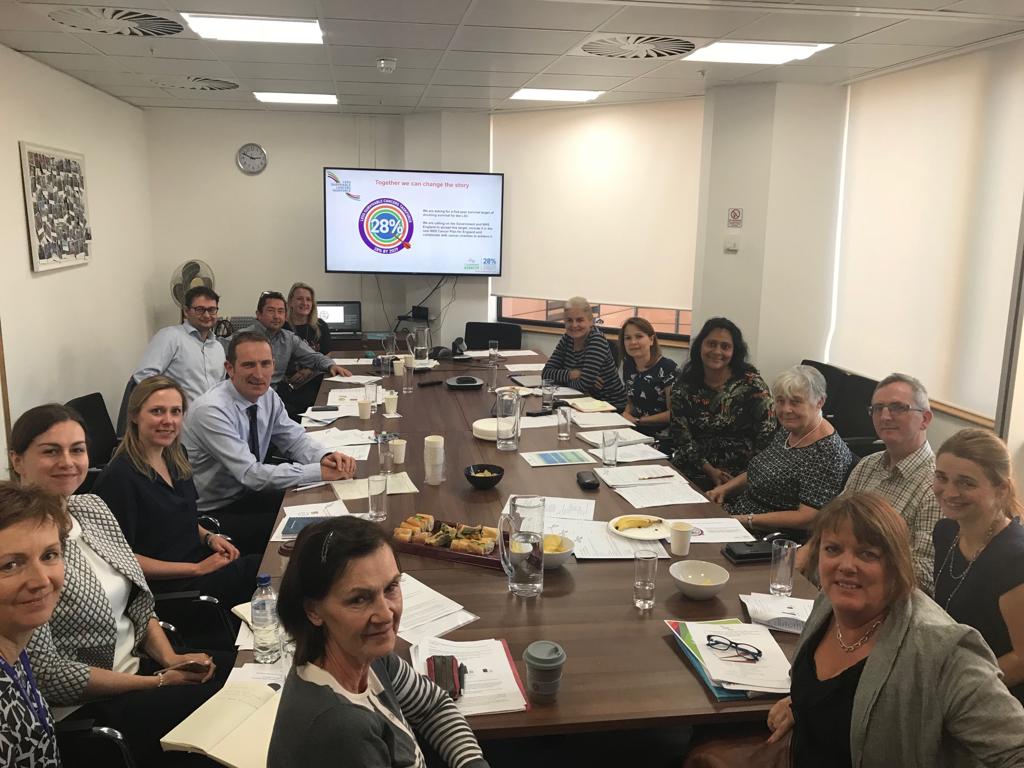Cameron Miller, Head of Policy & Public Affairs highlights our recommendations for the NHS long term plan
Last Thursday, we gathered alongside our partners in the Less Survivable Cancers Taskforce and NHS England.
As a group of charities who very much put the voice of patients at the heart of all that we do, we were joined by members of our respective communities, nurses who have worked directly with patients and those who support people every day through our respective helplines.
The highlight was, without a doubt, the patients offering their perspective on what they would like to see happen.
The consensus in the room was that being diagnosed with a cancer of this kind can actually lead healthcare professionals to write a person off and not offer them the support or treatment options that they want.
A pancreatic cancer patient shared the experience of having to ask for a particular treatment to be tried because it ‘only worked in 30% of cases’, she reminded the room that 30% was the highest statistics she had heard since being diagnosed.
I was proud to sit alongside Steve and Katheryn White. Steve has a glioblastoma diagnosis, and both echoed the sentiment of being ‘written off’ with Steve being told that a home assessment wasn’t necessary because of his prognosis.
He spoke passionately in the meeting about people having the right to try treatments, and that control should be in the hands of the patients, with them able to decide for themselves what treatments are and are not suitable.
NHS England listened with genuine interest to the contributions. They acknowledged the NHS is not perfect, but they also know that people are working exceptionally hard to continue to improve and build on an exceptional foundation with an incredible workforce.
There was also an opportunity to present our submission that we have made to NHS England, as a Taskforce, for the NHS Long Term Plan. We have called for there to be an explicit five-year survival target of 28%, representing a doubling of the current combined outcome.
The current targets are aggregated targets of all cancers and achievement will not necessarily mean we have made the gains in this group that we need to.
We have also called for there to be more awareness campaigns for symptoms and early diagnostic programmes to help support earlier diagnosis.
Each partner has their own examples of what this may look like and we have presented NHS England with the details of these campaigns to demonstrate their effectiveness.
We also asked for them to examine pathways to treatment. Many of these diseases increase their positive outcomes by being treated as soon as possible. Though this does not always happen in practice, and as such we are asking them to ensure that these cancers move through the system as quickly as possible to give people the best chance of survival.
Additionally, on our list we recommended that the Accelerated Access Pathway is expanded. Due to launch this year, it will only look at five drugs a year and we would like to incentivise those that treat less survivable cancers so as to ensure a more ready supply of new treatments for these diseases.
Finally, we have called for there to be more investment in research and specific NIHR calls for these disease areas. Currently the charity sector is picking up the slack of investment in these disease areas, investing twice as much as Government into research.
Now some of these calls are more or less relevant for brain tumour patients, and that is because as a coalition we work together to support one another and bring together a united voice.
What we all share though is a sense of injustice that these diseases have been left behind, and a desire to see that change in the future.
We hope NHS England were listening and it will include them in their long-term plan for the NHS.
